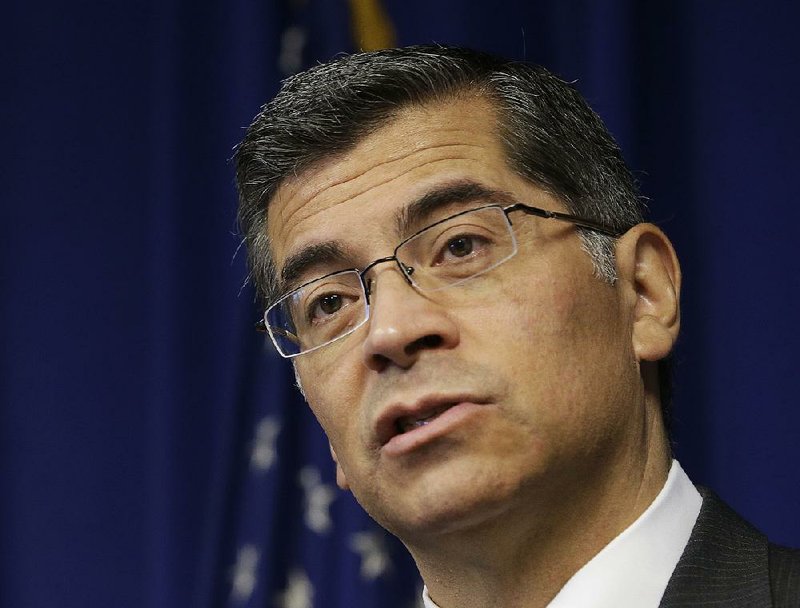WASHINGTON -- The decision by President Donald Trump's administration to ask people about their citizenship in the 2020 census prompted states that tend to vote Democratic to sue, citing worries that immigrants will dodge the survey altogether and as a result dilute the states' political representation.
California Attorney General Xavier Becerra on Tuesday filed a federal lawsuit that seeks to block Commerce Secretary Wilbur Ross' late Monday decision to add the citizenship question.
In New York, Attorney General Eric Schneiderman said he was leading a multistate lawsuit to stop the move, and officials in Connecticut, Delaware, Illinois, Massachusetts, New Jersey, New Mexico, Oregon, Pennsylvania, Rhode Island and Washington said they would join the effort.
"The census constitutes the backbone for planning how and where our communities will invest taxpayer dollars," Becerra said in a statement. "California simply has too much to lose to allow the Trump Administration to botch this important decennial obligation."
The Trump administration defended the citizenship question by saying it was needed to better enforce the Voting Rights Act, which relies on accurate estimates of voting-eligible populations.
The Justice Department said in a statement that it "looks forward to defending the reinstatement of the citizenship question, which will allow the department to protect the right to vote and ensure free and fair elections for all Americans." The Commerce Department said the benefits of obtaining citizenship information "outweighed the limited potential adverse impacts."
[U.S. immigration: Data visualization of selected immigration statistics, U.S. border map]
White House press secretary Sarah Huckabee Sanders said in a briefing that the decision to gather citizenship data was "necessary for the Department of Justice to protect voters."
Sanders also said the citizenship question had "been included in every census since 1965, with the exception of 2010, when it was removed."
Various citizenship questions have appeared in many censuses since 1850. But it was dropped from the 1960 general census -- there was no census in 1965 -- and relegated in 1970 to a longer list of questions that were asked of a small minority of residents. After 2000, the question was asked only on the American Community Survey, a separate voluntary poll.
Several states that have slowing population growth or high numbers of immigrants, such as California, New York, Illinois and Massachusetts, are typically at risk of losing U.S. House seats when their congressional districts are redrawn every 10 years -- depending on how fully their residents are counted.
An undercount could cost California at least one seat in the House of Representatives and, on the national level, shift political power from cities to more rural communities with the benefits falling to the Republican Party, the Washington Post has reported.
California's lawsuit alleges the change violates the constitutional requirement of "actual Enumeration" of every person in every state, every 10 years.
"It is long settled that all persons residing in the United States -- citizens and non-citizens alike -- must be counted to fulfill the Constitution's 'actual Enumeration' mandate," the lawsuit stated. Becerra also argued the move violated the Administrative Procedure Act's prohibition against "arbitrary and capricious" agency action.
Schneiderman, the New York attorney general, said adding the question was a "reckless decision to suddenly abandon nearly 70 years of practice." He argued that the move "will create an environment of fear and distrust in immigrant communities that would make impossible both an accurate census and the fair distribution of federal tax dollars."
Democratic lawmakers had been bracing for the decision to add the citizenship question.
A bill sponsored by Rep. Carolyn Maloney, D-N.Y., would block the addition of a citizenship question or any major design change, unless it has undergone a certain level of research and testing, but the measure faces dim prospects with no Republicans signing on.
House Democratic leader Nancy Pelosi said Tuesday that adding a citizenship question "will inject fear and distrust into vulnerable communities and cause traditionally undercounted communities to be even further under-represented, financially excluded and left behind."
In an attempt to minimize any impact on response rates, Ross directed the Census Bureau to place the citizenship question last on the census form.
Republican praise
Some Republican lawmakers hailed the decision on Tuesday.
GOP Sens. Jim Inhofe of Oklahoma, Tom Cotton of Arkansas and Ted Cruz of Texas had sent a letter to the Commerce Department asking Ross to add the question.
"It is imperative that the data gathered in the census is reliable, given the wide ranging impacts it will have on U.S. policy," Cruz said in a news release issued by the three lawmakers. "A question on citizenship is a reasonable, commonsense addition to the census."
Alabama Attorney General Steven Marshall said that the ongoing American Community Survey, which provides citizenship data on a yearly basis, is so small, with a correspondingly large margin of error, that it is an ineffective tool for understanding lightly populated rural areas of the country.
"It just makes sense that government has a more accurate record for the census and reinstates the practice of including a citizenship question in the next census," Marshall said.
A joint fundraising committee for Trump's re-election campaign and the Republican National Committee highlighted the addition of a citizenship question in a fundraising pitch last week. The pitch said Trump wants the 2020 Census to ask people whether they are citizens, and that in another era, this would be common sense.
"The President wants to know if you're on his side," the solicitation asks.
Census counts are taken by mail and by workers walking neighborhoods. The Census Bureau says the 2010 census drew a large response, with about 74 percent of the households mailing in forms and remaining households counted by workers in neighborhoods.
Information is only released publicly in the aggregate, although the government has the details. In 2010, former President Barack Obama's administration offered assurances that the census data would not be used for immigration enforcement.
The Census Bureau states on its website that personal information obtained through its surveys cannot be used against respondents by any government agency or court. And the disclosure by an employee of any information that would personally identify a respondent or family can lead to up to five years in prison or a fine of $250,000, or both.
Critics disputed the government's claims that adding a citizenship question would have minimal effects.
Former U.S. Attorney General Eric Holder, who serves as chairman of the National Democratic Redistricting Committee, said in a statement that the decision could lead to "devastating, decade-long impacts on voting rights and the distribution of billions of dollars in federal funding."
"We will litigate to stop the Administration from moving forward with this irresponsible decision," Holder wrote. "The addition of a citizenship question to the census questionnaire is a direct attack on our representative democracy."
Others focused on the potential for intimidation and an inaccurate count.
"I can only see one purpose for why this question is being added," said Arturo Vargas, executive director of the National Association of Latino Elected and Appointed Officials Educational Fund, an organization that seeks to advance Hispanic political engagement. It's to "scare Latinos and others from participating in the 2020 Census."
Ali Noorani, executive director of the National Immigration Forum, an advocacy organization in Washington, D.C., echoed that fear.
"The immigrant community, documented or not, will think twice before sharing information with the government," said Noorani, who deemed the citizenship question "data-based fearmongering."
News of the citizenship question this week made headlines in Spanish-language papers and on television, which is how Cesar Morio, a Mexican construction worker illegally living in the U.S., heard about it.
"I know that no parent in my neighborhood is going to be opening the door for anyone doing a survey," said Morio, 32, a stucco plasterer helping to erect a multimillion-dollar home in Los Angeles.
He is single and does not have children.
Carmen Queveda, a 46-year-old baby sitter and housekeeper who also lives in the U.S. illegally, said she won't participate in a census that inquires whether she is a citizen.
"I would never answer, because I don't have papers," the Guatemala native said Tuesday. "Obviously, I am afraid," she said, noting that she has a 14-year-old son.
Information for this article was contributed by Kevin Freking, Hope Yen and Amanda Lee Myers of The Associated Press; by Miriam Jordan, Michael Wines and Emily Baumgaertner of The New York Times; and by Samantha Schmidt, Heather Long and Tara Bahrampour of The Washington Post.
A Section on 03/28/2018

